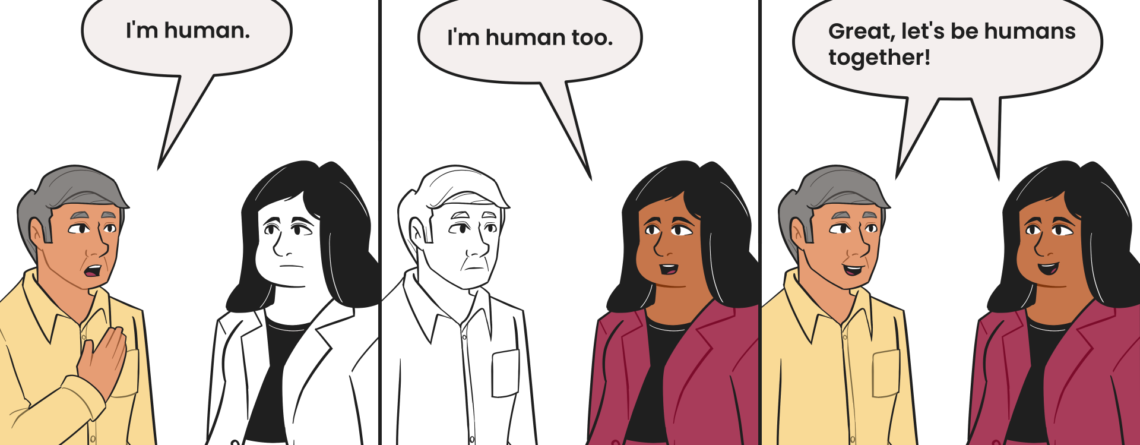The Benefits of Vulnerability
The Nystrom & Associates providers consulted for this article on the benefits of vulnerability are Michelle Iversen, LMFT and Brett Cushing, LMFT. Michelle and Brett are Outpatient Therapists and the co-hosts of Everyday Therapy Podcast
While it may feel uncomfortable, vulnerability can be a powerful tool for building deeper connections. By opening up and sharing our true selves, we can foster healthier relationships with family, friends, coworkers, and loved ones. In the first episode of the Everyday Therapy Podcast, hosts Michelle and Brett explore the many benefits of vulnerability. Keep reading to discover how vulnerability can transform your life.
Related: 4 Conflict Resolution Skills for Better Relationships
What is Vulnerability?
Vulnerability means being open and honest about your feelings. It's like sharing your secrets with a friend. When you're vulnerable, you give people the opportunity to get close to you.
Sometimes, it's hard to be vulnerable. We might worry about what others think or feel scared of getting hurt. But, being vulnerable can help us build stronger relationships. When we're vulnerable, we're showing people that we trust them. We're also showing ourselves that we're strong enough to handle our feelings.
Related: 5 Benefits of Telehealth
Why is Being Vulnerable So Difficult?
Being vulnerable causes us to be seen and exposed, sometimes creating an underlying fear of rejection. For example, you might think, “What would happen to me if other people really saw me for who I am?” Michelle helps to explain this fear.
Many people struggle with being vulnerable, and some people may be wired to be more "threat-sensitive" and therefore more likely to want to protect their thoughts and emotions from others (even in safe social situations). It may feel as though this will protect us from emotional harm, but it can sometimes damage our relationships with others when we don't allow any of our vulnerabilities to show.
The good news is that there are ways to help us open up in our relationships. “Working in therapy, we can help to change this response and activate a helpful area in our brain associated with social safety," Michelle said. "This will increase our vulnerability with safe people in our lives, but at the same time, we will also increase our social connectedness with others and be seen as more authentic, strong, open, and courageous.”
Related: Social Media and Mental Health: What's the Impact?
The Benefits of Vulnerability
Building Trust: When you show others that you trust them with your thoughts and emotions, it allows them to see you are a safe person who they can also open up to. Not only do you trust them, but you're showing they can trust you, too.
As Brett says, "When there’s no vulnerability, and I don’t let you or anybody else see the real me, there’s no real know-ability. You don't know me; you just see this exterior of me. In contrast, know-ability leads to intimacy and connectivity with one another."
Promoting Authenticity: Being vulnerable can also help you feel more free. When you stop worrying about what others think, you can relax and be yourself. "If we buy into that myth that we always need to be strong, perfect, and capable...the research says we’re really at risk as coming across as the opposite, as inauthentic," Michelle said.
Liberation: When you share your feelings, you don't have to carry them around by yourself anymore. You can let go of the stress and anxiety that comes with holding things in.
Related: 5 Benefits of Working at Nystrom & Associates
When Can You Be Vulnerable?
It might be tempting to tell everyone everything right away, but that's not always the best idea. Going all in can shock the system and can be contradictory to the benefits of vulnerability.
You don't have to share your deepest secrets with everyone. Start by sharing a little bit about yourself with someone you trust. Pay attention to how it feels. If it feels good, you can share a little more next time.
Remember, it's important to find someone who is also willing to be open with you. A good relationship is built on trust and honesty. It's okay to take things slow and be patient.
Related: How Interpersonal Effectiveness Improves Your Relationships
A Word From Nystrom & Associates
Being vulnerable doesn’t always come easy. A great space to start opening up is therapy. If you need support, talk with us at 1-844-NYSTROM or request an appointment online.
Want to listen to the entire podcast episode on The Benefits of Vulnerability? Click here to subscribe to the podcast.







